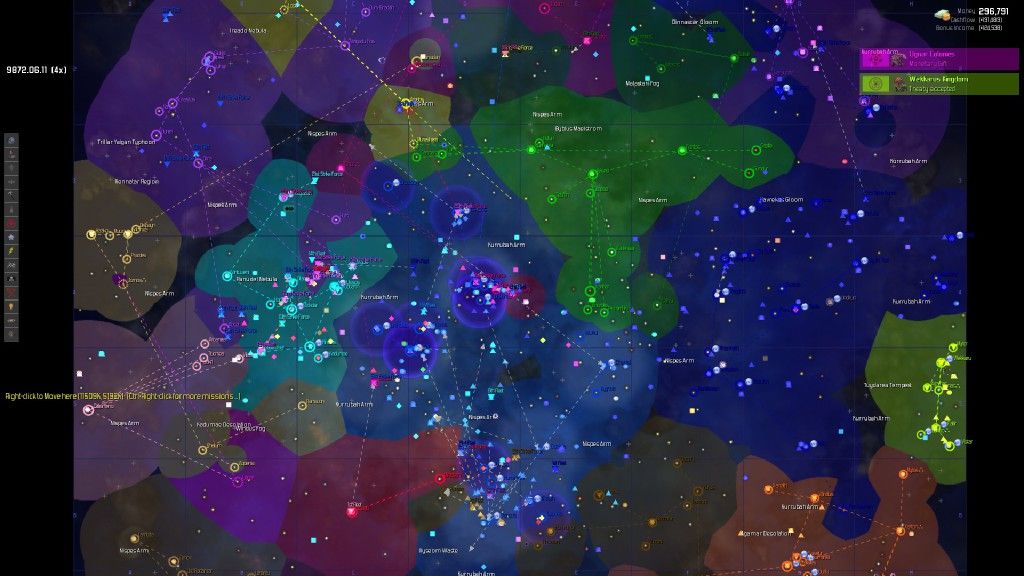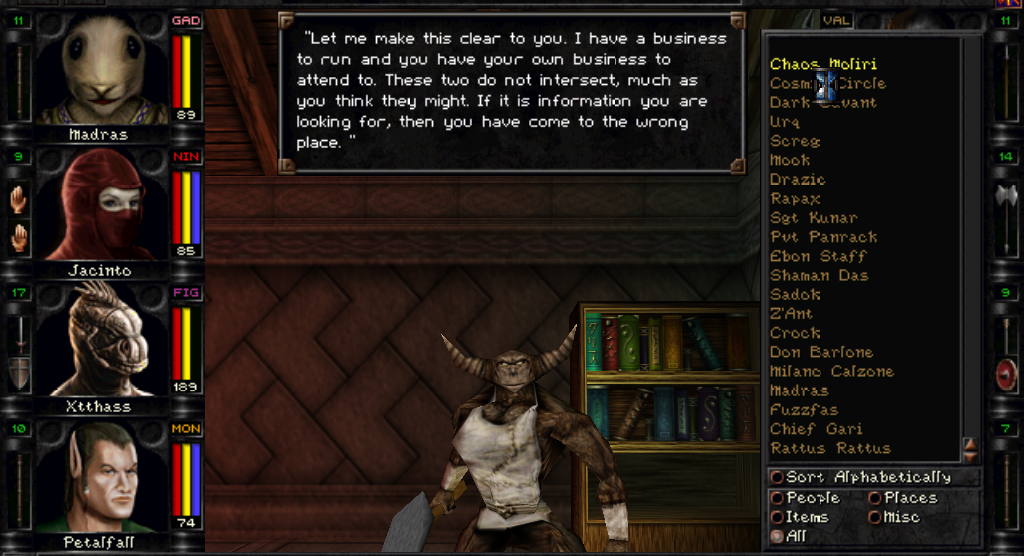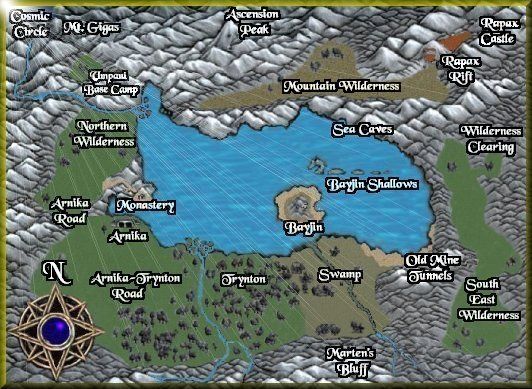Christmas, isolation tanks, my website, and computer role-playing games in The Amalgamated Aggromulator
- Jan. 22, 2015, 11:59 a.m.
- |
- Public

So I edited the short story “The Grove” (which can be found here), and then resumed and completed work on the All Ages version of the novel Fluency, and then I incorporated all the edits of the All Ages version into the second edition of the original version. I got paid.
. . . And then a dry spell followed, during which I began to worry seriously about my initial exuberance.
But now I am crunching my way through a novella for a different writer.
It is one of those evenings when I am feeling a little woozy. I can only edit for about four hours at a stretch, sometimes even fewer with the heavy line-by-line work I’m doing, and it always seems as if far too few pages have been done to have had this effect on me. So many decisions, and fixes, and rethinks of fixes, until I am no longer ready to wrestle with the next sentence. The exhaustion has funny half-drunken effects on my beleaguered forebrain - I speak imprecisely, I write immoderately in comment threads. All of my efforts to write journal entries look dry and flat, as though all the juice has been squeezed out of them in advance. I promise nothing from this update. Nothing.
By the way, here is my website as a copyeditor.
If you know someone with a manuscript who could use a person with a gimlet eye to go over his or her writing, feel free to pass it on. :-)

The original spate of work led to quite the income in December. Did I ever turn up the disco when the biggest payment came into PayPal!
A little delirious with the degree to which the drought had broken, I did something that I can’t actually defend, and that I certainly won’t be doing in future to the same extent, but that I can’t regret. It was now Christmas season, and I had not been able to fulfill my Santa Claus impulses properly for years on end - and not out of season, either. In some of those years I had been unable to do anything at all. So, this year - in addition to some wise (I hope) and practical purchases and in addition to starting a savings account which urgently needs building - I was suddenly able to do Christmas properly. I touched friends and family in interesting ways that I had been thinking of and writing down against opportunity. I worked my way back to worrying about money again very efficiently, but it was glorious.
The four gifts that I am happiest about (aside from buying chicken soup ingredients for a poor and flu-stricken friend in another city through a grocery delivery service, which it was wonderful to be in a position to do) were four gift certificates, sent through email.
Each of these certificates was good for a ninety-minute float in an isolation tank at a facility near the recipient’s home.
(Or a “flotation tank,” the more popular phrasing. But after seeing the movie Altered States in my early teens and reading the remarkable books of John C. Lilly, I don’t think I’ll ever drop “isolation tank.”)

It is surprisingly easy to find out where the nearest isolation tank is! In eight countries it is, anyway.
One was for my sister-in-law in Seattle. (I don’t know whether she’s done it yet.)
One was for a very overworked friend in Atlanta. (She has done it.)
One was for my friend paraquatlung in Philadelphia. (She has done it, and gave me a marvelous account of getting ecstatically lost in a parking garage after leaving the facility.)
One was for an extremely pregnant friend in Melbourne. (Pregnant women apparently love the respite from gravity, but this one did not come off as planned, although the float may still happen. During the delay imposed by the need to get advice from her doctor as to whether she should do this at such an advanced stage, she had her beautiful baby, and I am far from sure that anything except the baby has crossed her mind since.)
Now - doing things slightly out of order, as always - all I need to do is to finally try it myself. But that’ll have to wait for my next big paycheck.
One of the aforementioned friends up and retaliated, which always takes me by surprise. She got me an Xbox!, which is one of those dedicated computer-game machines with a blazing-hot graphics processor that requires an equally outsize cooling fan that whooshes so loudly that I have to turn up the game volume to drown out the sound of the howling gale. I had only ever been playing a few things that ran on a regular PC. (Well, there was the old Atari around 1982.)
The purpose of this amazing arrival on my doorstep was so that I could play Mass Effect, Mass Effect 2, and Mass Effect 3, which (either “are” or “is”) an RPG or role-playing game, a story-adventure of galactic scope, and which showed up two days later.

The key to a great computer role-playing game is immersiveness. There must be a story, that you can immerse yourself in . . . and there must be all manner of details to help you lose yourself. This seems to me to be the big secret. Real life is a matter of dealing with all manner of humdrum details and little puzzles and annoyances, much more than it is a matter of dealing with Grand Themes (when you can actually find any). Mass Effect is in this respect very much like Wizardry 8, a not-quite-finished-when-released (the company was folding) game from 2001, primitive by comparison, that Gwen and I absolutely loved. In both games there is peril, and there are wondrous sights, and there is Grand Significance, but what actually gets you is all the fiddling details of inventory management, and the tedious little steps and necessities, that you deal with and deal with and deal with until the fact that all this is part of a fiction and a light amusement has receded to the edges of your awareness.
Mass Effect is a space opera - a story of grand operatic adventure with spacecraft and on other planets. It fits amusingly with the Space Opera Facebook group and the clutch of writers in which I have begun finding work.

My experience is very limited, but I think that, if I had to pick two games I know that fit into the “space opera” group and that are really worth playing, I would pick Mass Effect and the game Distant Worlds. Distant Worlds is a strategy game that I reached for in the first tunnelling months after Gwen died . . . and fortunately, or made fortunately profligate by grief, I shelled out for the first two expansions as well and installed them all at once, for this game is so complex, and was on its initial release so inscrutable, that it only became really playable in the updated versions. (The complete version, with all the expansions combined, can now be purchased as a unit.) Distant Worlds is not an RPG. Where Mass Effect is the story of a single person and his or her friends against a backdrop of the fate of empires and species, Distant Worlds is the story of one of those empires (whichever empire you choose) as a whole during a turbulent stretch of history, and is experienced through reading bulletins and watching a galactic map while giving any orders you like, so, if Mass Effect is like Wizardry 8, Distant Worlds is more like an interstellar version of Risk.
But there is enough dazing detail that some of the same immersiveness is at work in Distant Worlds anyway; the veil becomes translucent. You come to play the grand strategist of the Securans, not dispassionately, but with an increasing amount of genuine dreamy patriotism about Securan civilization.
(Wizardry 8 itself would also count as a space-opera story; in the background there are certainly contending alien races and interstellar empires and grand matters of the fate of the universe. And Wizardry 8 is certainly worth playing! But Wizardry 8 is a tale of swords and sorcery, of wizards casting and priests invoking and warriors up the steps . . . that somehow coexist with electric lights, elevators, computers, and starships. I cannot bring myself to place this quirky melange in anything but its own special little bubble.)

What should a bemused Reader, perhaps unfamiliar with any such nonsense, think of all this digression into role-playing games and immersiveness?
Well, that’s the other thing. If the love of the places they put you into does not translate, then one thing may:
These games can save you money something extraordinary. They are very active, complicated, intriguing affairs . . . and they take a long time to play through. Wizardry 8 might take you seventy hours (in one- or two-hour blocs here and there) to play all the way through . . . if you hurry, and you’re unlikely to be in a hurry. And because there are all manner of ways in which to go about playing through the story, and all manner of branchings that the story can take based on your choices, and the endless shifting conundrums of the dangers and canny handling of them, the replayability factor can be incredible. These are not matters that would occlude the reading of good nonfiction or fiction, for a dedicated reader. Because they do not feed that part of the mind or the interest. These are not matters that, I think, would derail any interest or concern with weighty matters that a person has. Again, it’s not the same part of the brain. What these matters are, on the other hand, are exactly the sort of thing to catch the restless imagination and adventure-tickled, puzzle-seeking mood, and to defuse the staticky boredom, of a person who might otherwise be likely to go out and spend his money to find diversion!
Dear, clunky old Wizardry 8, which I bought for seventy dollars in the beginning, has over the ensuing years been played through over and over and over, with the most outlandish combinations . . . which has taken me thousands of happy hours to do. While not costing me a cent beyond laptop current since I bought it, in all that time.
It’s part of the puzzle.

Now go back one entry and look over the recipes. Those are worth your time. As I say, I didn’t promise anything for this.
Last updated August 19, 2015



Loading comments...